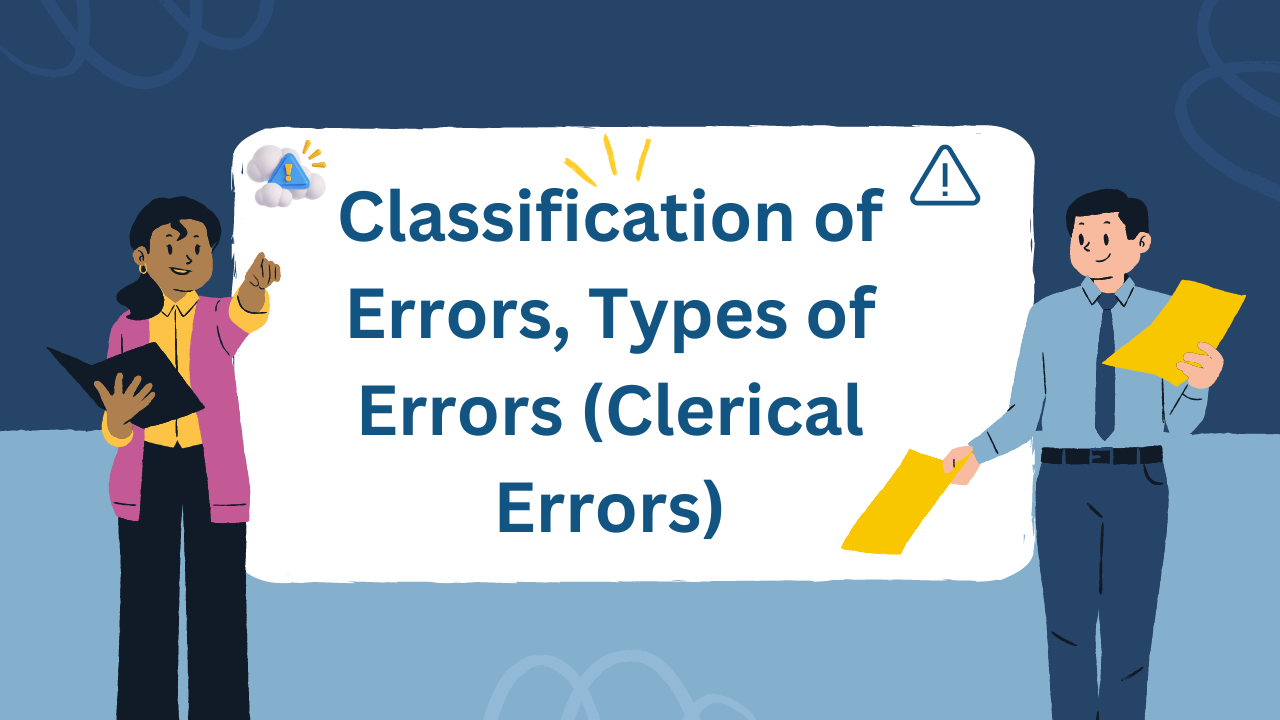Classification of Errors or Types of Errors: Every concern is interested in ascertaining its true profit and financial position at the close of the trading year. But in spite of the best efforts of the bookkeeper and the accountant, certain errors are committed in the recording of the transactions which affect the final accounts of the concern.
It, therefore, becomes of utmost importance for the bookkeeper and the accountant to locate such errors and rectify them so that the correct profit and financial position of the concern may be ascertained. So whenever errors in accounting records come to notice, they should be rectified without waiting till the end of the accounting year when Trial Balance is to be prepared. Must Check Accounting Concept.
Quick Links
Classification of Errors

A. Clerical Errors
Errors other than errors of principle are called clerical errors. The following are the types of clerical errors.
Errors of Omission: These errors arise as a result of some act of omission on the part of the person responsible for the maintenance of books of account. It refers to the omission of a transaction at the time of recording in subsidiary books or posting to the ledger. Omission may be complete or partial.
(a) Complete Omission: When any particular transaction has not at all been entered in the journal or in the book of original entry, it cannot be posted into the ledger at all and a complete error of omission will occur. The trial balance is not affected at all by such errors e.g. failure to record complete credit sales in the sales book. However, the trial balance will agree, if the debit side, as well as the credit side of a journal entry, is not posted to the ledger.
(b) Partial Omission: This means that the transaction is entered in the subsidiary book, but is not posted to the ledger, such errors affect the agreement of trial balance e.g. omitting to post the discount columns of the cash book.
1. Errors of Commission:
These errors arise due to some positive act of commission on the part of the person responsible for the maintenance of the books of account. These mistakes are committed because of ignorance, lack of proper accounting knowledge, and carelessness of the accounting staff. They are committed while recording transactions. These errors may or may not affect the agreement of trial balance.
- Mistake in balancing an account.
- Mistake in posting so far as the amount is wrongly written. A common mistake, for example, is to transpose figures – to write Rs 115 instead of Rs 151. This will cause a mistake of Rs 36 and a corresponding difference in the trial balance. The total of all the figures of the difference thus caused is 9 or multiples of 9. (Students should note that in case of transposition of figures, (i) the difference in trial balance will always be divisible by 9, (ii) the total of all the figures of the difference will also be divisible by 9. Suppose, you have written 67895 instead of 95678 or in any other way, provided the figures are the same, the difference 27783 (i.e. 95678 – 67895) is divisible by 9. Hence, if the difference in the trial balance is divisible by 9, it may be assumed that there may be a transposition of figures.
- Making an entry on the wrong side. For example, if instead of debiting an account with Rs 500 it is credited with the amount, the debit balance, in the trial balance will be shorter by Rs 1,000. A mistake on the wrong side causes the difference to be double the amount involved.
- A mistake in the casting of subsidiary books. A mistake in the total of the Purchases Book will affect the Purchases Account, a mistake in the total of the Sales Book will mean a corresponding mistake in the Sales Account. Similarly, the total of the Returns Book, if wrongly done, would mean that the Returns Inwards Account or Returns Outwards Account will be posted with the wrong amount. These mistakes will be reflected in the trial balance.
It must be noted that a mistake in the totals of the subsidiary books will not affect the correctness of the various personal accounts of customers and creditors. You may also like Accounting Concept.
2. Compensating Errors:
They are a group of errors, the total effect of which is not reflected in the trial balance. These errors are neutralizing in nature, hence one error is compensated by other errors or errors of opposite nature. For example, an extra debit in the purchase account may be compensated by an extra credit in the sales account. Thus, compensating errors do not affect the agreement of trial balance.
B. Errors of Principle
When a transaction is recorded in contravention of accounting principles, like treating the purchase of an asset as an expense, it is an error of principle. In this case, there is no effect on the trial balance since the amounts are placed on the correct side, though in the wrong account. Suppose on the purchase of a typewriter, the office expenses account is debited; the trial balance will still agree. In Simple Words: These errors arise because of the failure to differentiate between capital expenditure and revenue expenditure and capital receipts and revenue receipts.
The distinction between capital and revenue is of relevance because any incorrect adjustment or allocation in this respect would falsify the final results shown by the profit and loss account and the balance sheet. These errors do not affect the agreement of trial balance. For example, debiting the purchase of furniture to the office expenses account, crediting the sale of furniture to the sales account, etc.
Recommended







